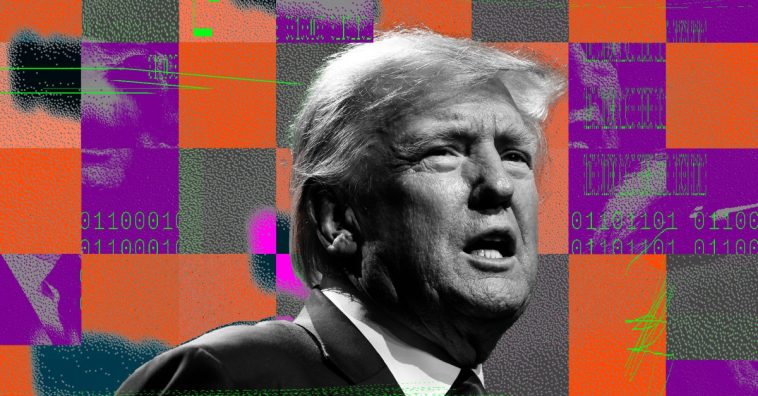China opens Google antitrust probe in retaliation to tariffs
China has launched an antitrust investigation into Google as part of a salvo of responses to US tariff increases, including its own retaliatory tariffs and export controls. China’s State Administration for Market Regulation announced the Google probe on Tuesday over suspicions the US search giant had violated Chinese antimonopoly laws, according to a machine translation of the statement.
Google’s search and internet services have been blocked in China since 2010, but the antitrust investigation may interfere with its other dealings with Chinese companies. Details about the probe are slim. It was announced within minutes of President Trump’s 10 percent tariffs on Chinese goods going into effect.
Read Article >
Shein and Temu depend on a 100-year-old tariff loophole that Trump wants to close
Image: Cath Virginia / The Verge, Getty Images
President Donald Trump’s sweeping tariff threats have been touch and go. As it stands currently, the 25 percent tax on goods from Mexico and Canada is on ice for a month, but a 10 percent tariff on Chinese goods is set to take effect on Tuesday, via an executive order of questionable legality.
Nestled within the order is a brief but important provision that could change how Americans shop online: the closing of a little-known loophole called the de minimis exception.
Read Article >
Trump agrees to a one-month pause on Mexico, Canada tariffs
Image: Cath Virginia / The Verge, Getty Images
On Monday morning, Mexican President Claudia Sheinbaum and US President Donald Trump announced the US is pausing tariffs against Mexico for one month, as previously reported by Bloomberg. In the afternoon, a similar deal was announced by Trump and Canadian Prime Minister Justin Trudeau to pause proposed tariffs for 30 days. Trudeau cited Canada’s $1.3 billion border plan and said it would also make new commitments, including a joint strike force and an intelligence directive aimed at organized crime.
There’s no word yet on any kind of delay in implementing a pause for tariffs on China.
Read Article >
Big Tech has been silent on Trump’s tariffs
Image: Cath Virginia / The Verge, Getty Images
President Trump announced tariffs as high as 25 percent on goods imported from Canada, China, and Mexico over the weekend. But some of the biggest names in tech and gaming – who could be significantly impacted by the tariffs – have stayed quiet about them.
Shortly after the tariffs were announced, The Verge reached out to many tech companies requesting comment, and only Google and Microsoft replied to decline to comment. This morning, I sent emails to Apple, Google, Meta, Microsoft, Nintendo, Samsung, and Sony, but have not received comments back. I also emailed Nvidia, and spokesperson Stephanie Matthew declined to comment.
Read Article >
Ontario is ‘ripping up’ Starlink contract in response to US tariffs
Image: Cath Virginia / The Verge, Getty Images
The Canadian province of Ontario is canceling a C$100 million (about $68 million USD) contract with Starlink in response to tariffs US President Donald Trump issued on Canada over the weekend, reports The Associated Press. Ontario Premier Doug Ford wrote on X today that the region is also “banning American companies from provincial contracts” until the tariffs are removed.
“We’ll be ripping up the province’s contract with Starlink,” Ford wrote, “Ontario won’t do business with people hellbent on destroying our economy.” He said the province spends “$30 billion on procurement” for regional projects.
Read Article >
Automakers brace for ‘massive’ impact of Trump’s tariffs
Image: Cath Virginia / The Verge, Getty Images
Your next car purchase is probably going to be more expensive, thanks to President Donald Trump.
Around 5.3 million vehicles are built in Canada and Mexico, 70 percent of which are destined for the United States. Those vehicles will soon be subject to 25 percent tariffs, which were just announced by the Trump administration. And the companies paying the higher price to import those vehicles are very likely to pass that cost along to the consumer — to you.
Read Article >
China responds to Trump’s tariffs threatening ‘corresponding countermeasures.’
Now that Donald Trump has issued tariffs on products from China, Canada, and Mexico, Canada responded with tariffs of its own, and China’s Ministry of Commerce said in a statement (via Google Translate) that it “will file a lawsuit with the WTO for the wrong practices of the United States and will take corresponding countermeasures to firmly safeguard its own rights and interests.
China’s Ministry of Foreign Affairs issued its own statement, saying (translated), “The United States should view and deal with its own fentanyl problem objectively and rationally, rather than threatening other countries with tariffs at will.”
Canada will retaliate against Trump with tariffs on US goods
Image: Cath Virginia / The Verge, Getty Images
Canada will set its own tariffs against US goods in retaliation to broad 25 percent tariffs President Donald Trump announced on Saturday on Canadian imports. Prime Minister Justin Trudeau announced a 25 percent tariff on a total of C$155 billion worth of American goods — C$30 billion of that on Tuesday when Trump’s tariffs go into effect, then an additional C$125 billion after 21 days. Trudeau also warned that the US tariffs will harm both countries’ economies, particularly the auto industry. “This is a choice that, yes, will harm Canadians, but beyond that, it will have real consequences for you, the American people,” he said in a press conference on Saturday.
Trudeau offered a “far-reaching” list of products that would be subject to import taxes, including American alcohol, orange juice, clothing, appliances, lumber, and plastics, along with “much, much more.” Non-tariff moves like reexamining public procurement policies are also on the table. However, he said that actions like limiting energy exports would require more careful consideration because “no one part of the country should be carrying a heavier burden than any other.”
Read Article >
Trump imposes sweeping tariffs on Canada, Mexico, and China
Image: Cath Virginia / The Verge, Getty Images
The US is officially imposing tariffs on Canada, Mexico, and China. President Donald Trump announced that goods imported from Mexico and Canada will face a 25 percent tariff, while goods from China will face a 10 percent tariff. There will also be a lower 10 percent tariff on energy resources from Canada. In a series of posts on X announcing the tariffs, the administration claimed they were happening to “hold China, Mexico, and Canada accountable for their promises to halt the flood of poisonous drugs into the United States” while repeatedly referencing fentanyl.
The tariffs are set to go into effect on Tuesday, February 4th, according to The New York Times. They’re expected to have an impact on a huge swath of goods, ranging from the electronics we use every day to necessities like clothing, pharmaceuticals, and lithium batteries.
Read Article >
Canadian officials have reportedly been notified of tariffs.
Despite no public announcement yet on the expected tariffs against Canada, Mexico, and maybe China, Canadian officials tell reporters they’ve been notified President Donald Trump is imposing a 25 percent tariff on most goods and a 10 percent tariff on energy products (i.e. oil). Tariffs were supposed to go into force today, but they’re now apparently supposed to hit Tuesday, at least in Canada. A response from Canada is expected later today.
Trump’s first round of tariffs is almost here
Electronics, avocados, vegetables, cars, tractors, crude oil — these are some of the things that could soon get more expensive for US consumers. Under President Donald Trump’s proposed plan, goods coming in from Mexico and Canada will be subject to a 25 percent tariff beginning on February 1st. White House press secretary Karoline Leavitt has also said Trump was “very much still considering” tariffs on China on the same day. As of late Thursday, the specifics of these plans were still up in the air.
Sweeping tariffs were one of Trump’s marquee campaign promises leading up to the election in November. He’s previously threatened up to a 60 percent tariff on goods from China, a 100 percent tariff on goods from Mexico, and even a 200 percent tariff on John Deere products imported into the US. Despite this, Trump failed to levy any tariffs on day one of his presidency, with Bloomberg reporting on Thursday that his administration lacked even concepts of a plan. His first round is now supposed to hit goods from Mexico and Canada, the two largest trade partners for the US.
Read Article >
Trump says he’ll put tariffs on imported chips ‘in the near future’
Image: Cath Virginia / The Verge, Getty Images
Without going into detail about what might happen to the $52 billion in subsidies from the CHIPS Act under his administration, Donald Trump said tariffs on foreign computer chips, semiconductors, and pharmaceuticals are coming “in the near future.” He also namechecked DeepSeek’s AI releases, saying, “…coming up with a faster method of AI and less expensive, that’s good. I view that as a positive if it is fact and it is true, and nobody knows, but I view that as a positive.”
In the speech at the House GOP Issues Conference held at the Trump National Doral Resort in Miami Monday afternoon, he said that to return the production of these goods to the US, “we don’t want to give them billions of dollars like this ridiculous program Biden has.” Instead the incentive for manufacturers will be “they will not want to pay a tax.”
Read Article >





GIPHY App Key not set. Please check settings